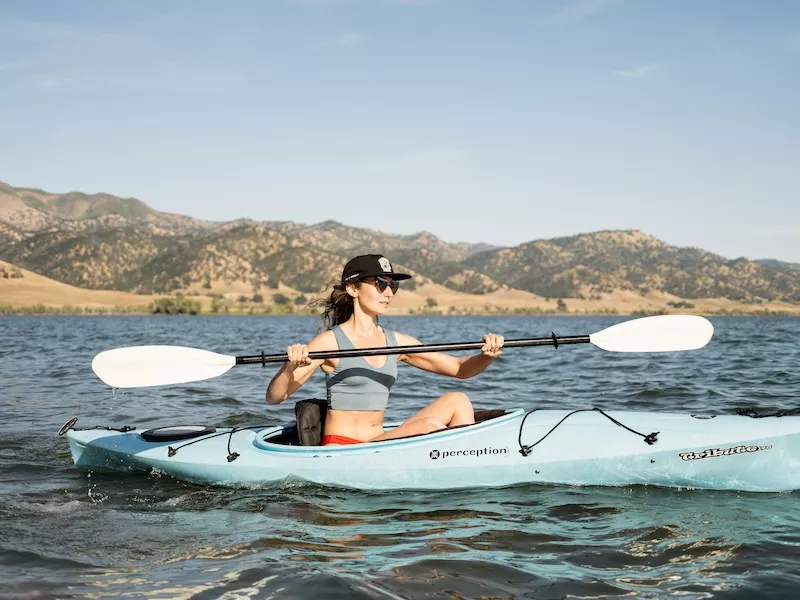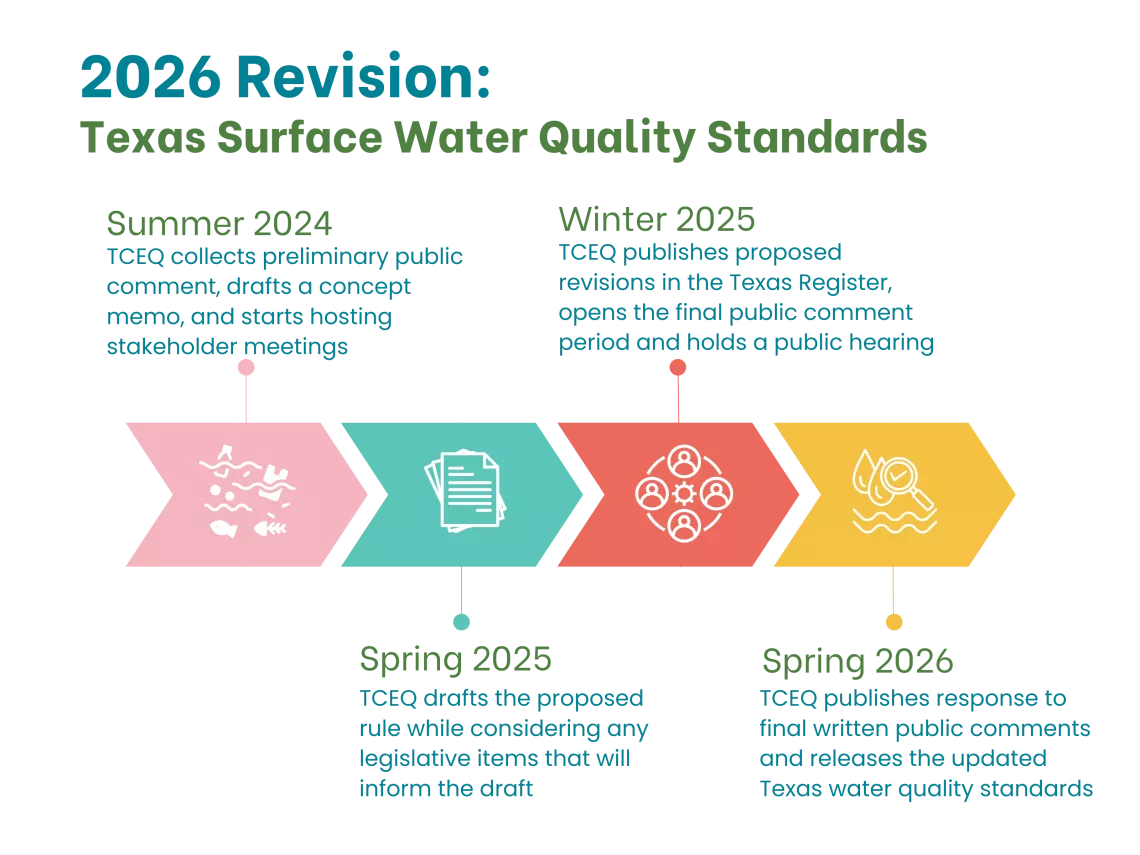
Photo by Ella Sophie, The Luupe
By Evgenia Spears
Let’s begin with a simple truth: water is life. As you’re reading this, you’ve likely used water recently—whether to quench your thirst, wash your hands, take a refreshing shower, bathe your child, or clean the dishes. Perhaps you’ve even enjoyed a day by a lake, river, or beach lately. Water is so seamlessly woven into our daily lives that we often take it for granted, yet it’s essential for nearly everything we do. But how clean is our water?
The Clean Water Act— federal legislation that regulates protection of the U.S. water resources—requires states to establish surface water quality standards to ensure that the state’s waters are fishable, swimmable, and drinkable. In Texas, this responsibility is fulfilled by the Texas Commission on Environmental Quality (TCEQ), which is required to review and update the Texas Surface Water Quality Standards (Standards) every three years. Public participation is at the heart of this process. In other words, TCEQ is expected to provide sufficient opportunity for Texans to voice their concerns about water quality in their communities and ensure that these concerns are addressed in an effective and transparent manner. Once TCEQ finalizes the revisions to the Standards, they are submitted to the EPA and can only take effect if the EPA grants its approval.
2022 Revision of the Texas Surface Water Quality Standards
The Texas Surface Water Quality Standards were last updated in 2022. The Sierra Club Lone Star Chapter stayed involved throughout the revision process, and in collaboration with six partner organizations, submitted joint comments outlining the critical water quality issues that must be addressed by TCEQ. Specific concerns that were brought up included calls for TCEQ to reconsider recreational use subdivisions and reduce bacteria levels, heighten standards on carcinogens, establish numeric salinity criteria, ban discharge of any plastics, develop more stringent standards for pristine streams, revise the antidegradation policy, along with the concerns about downgrading of specific water bodies. Thirteen organizations supported these comments, including Texas Campaign for the Environment, Environment Texas, Indivisible TX Lege, Turtle Island Restoration Network, Environmental Stewardship, Coastal Alliance to Protect Our Environment, Bayou City Waterkeeper, National Wildlife Federation, Carizzo/Comecrudo Tribe of Texas, Greater Edwards Aquifer Alliance, Ingleside on the Bay Coastal Watch Association, Environmental Integrity Project, and Friends of the Brazos River. The full document containing the joint comments on the 2022 Standards is available here.
Unfortunately, none of the ever-pressing water quality issues outlined by the Sierra Club and partner organizations were addressed by TCEQ in the final version of the 2022 Standards. (The TCEQ’s response to public comments submitted as part of the 2022 Standards revision process can be found here.) What this means for us is that we must persist in our efforts to ensure that water quality issues in Texas are given the attention they deserve to better protect public health and the well-being of ecosystems across the state.
Creating the Ripple Effect: The 2026 Revision
Are you happy with water quality in your community? Do you feel safe swimming in Texas lakes, streams, and rivers? Is the water clean enough for your children to play and enjoy? If you hesitate to answer “yes” to any of these questions, it’s time to take action.
TCEQ has recently started the 2026 revision of the Texas Surface Water Quality Standards. At the early stage of this process, the agency collected preliminary public comments to inform the revision. The Lone Star Chapter prepared and submitted its comments focusing on several water quality concerns posing a risk to public health and the well-being of native species across the state. In particular, we called for TCEQ to ban any kind of plastic discharge in Texas water bodies, establish numerical criteria for salinity in coastal waters, prohibit the discharge of produced water from oil and gas operations, reconsider the current classification of the recreational use categories, and revise the current antidegradation policy. Our comments received support from partners including the Watershed Association, Greater Edwards Aquifer Alliance, Environment Texas, Ingleside on the Bay Coastal Watch Association, Surfrider Foundation (Galveston, Coastal Bend, and South Texas Chapters), and the Turtle Island Restoration Network. While TCEQ promised to consider the preliminary comments in the rulemaking process, the agency stated that written responses will not be provided. Read the Lone Star Chapter’s preliminary comments to TCEQ here.

The Lone Star Chapter has taken additional steps and created an action alert to help amplify the voices of Texans throughout the 2026 revision cycle. In the first week of the action alert, 247 Texans signed the petition and 100 submitted their own concerns to TCEQ. Texas residents brought up a variety of issues ranging from the safety of drinking water and recreational activities to broader concerns such as the impact on human health and the future of our planet. They expressed worries about plastic pollution, industrialization of the Gulf Coast, produced water discharges, along with increasing salinity and its effects on wildlife and aquatic species. This feedback was submitted to TCEQ along with the Lone Star Chapter’s preliminary comments. Although the preliminary public comment period has closed, the Lone Star Chapter’s action alert will be live until next April to continue collecting public input on the Standards. We encourage you to sign the petition and share your concerns to advocate for water quality decisions that are more locally informed, equitable, and relevant to Texas communities.

Word cloud of the most common words from the public comments gathered by Sierra Club.
Next spring, TCEQ will draft a proposed rule, which is expected to be published in the Texas Register in Winter 2025. At about the same time, TCEQ will start hosting stakeholder meetings open to the public. Once the proposed revisions to the Standards are released, TCEQ will open the final public comment period and hold an in-person public hearing to gather more feedback from Texans. In Spring 2026, TCEQ plans to provide written responses to the public comments collected during the final comment period. It is important to note that while TCEQ is obligated to gather public input to comply with the provisions in the Clean Water Act, the agency ultimately has the discretion to decide whether to incorporate this feedback into the new Standards.
Your involvement is critical to shape the present and future of Texas water! Not only is it your fundamental right as a Texas resident, but by voicing your concerns and taking action, you help create a ripple effect that has the potential to influence water quality decisions. Without your participation, TCEQ may remain unaware of the water quality issues, struggles, and daily challenges faced by your community.
Here are some simple steps you can take to advocate for Texas waters:
- Sign the petition and leave a comment through our action alert right here
- Share our action alert with your friends and networks on social media: Instagram, Facebook, and X(Twitter)
- Sign up for updates on our water work and to learn more about our Water For People and the Environment Committee by clicking here
Help us create the ripple effect by getting involved in the 2026 revision of the Texas Surface Water Quality Standards to amplify local voices and bring attention of Texas decision-makers to where it is most needed!